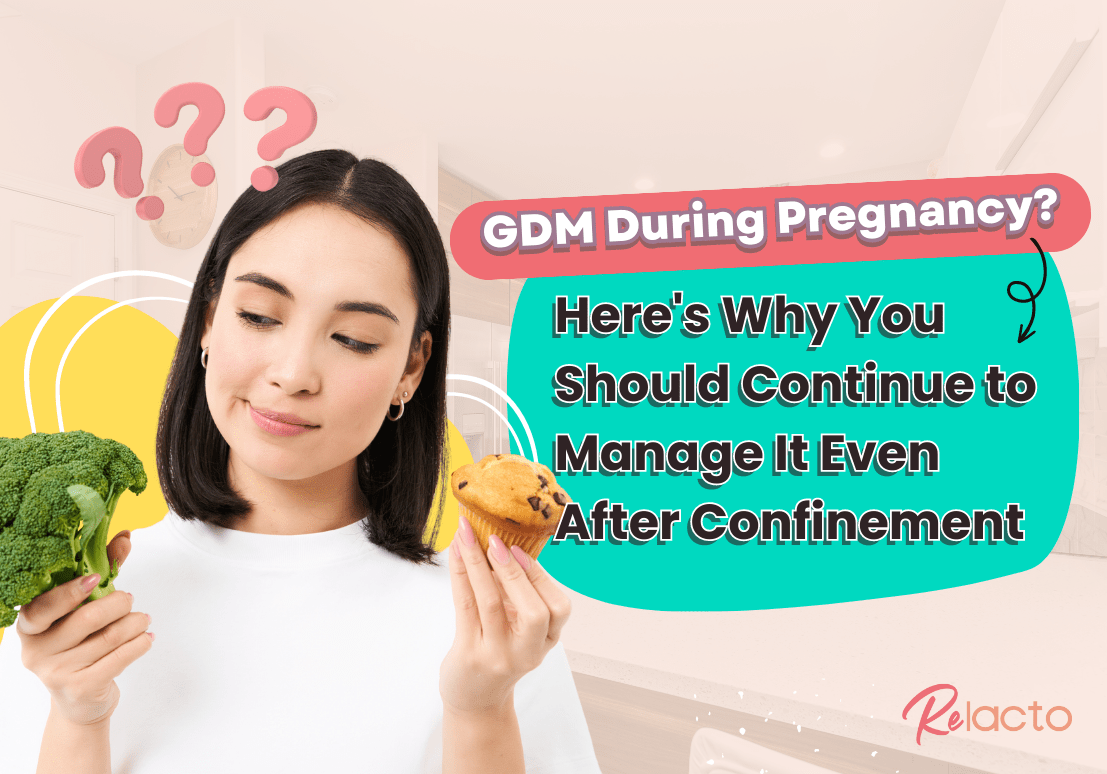Dietitian Shares: GDM During Pregnancy? Here’s Why You Should Continue to Manage It Even After Confinement

Gestational diabetes (GDM) is definitely something that many mothers are hoping they do not have. It actually causes a lot of anxiety during meal times as mothers worry about how this condition would affect their babies and themselves during pregnancy.
When blood glucose is not managed well during pregnancy, the baby is at risk of being a macrosomia baby, which means that the baby may grow too fast and too large. This can complicate childbirth. Chances that mothers may need to undergo emergency cesarean section are also much higher. However, when it is managed well, the risk of this happening is greatly reduced.
Gestational diabetes typically ends when the pregnancy ends. However, it is important to note that you are still at higher risk of developing Type 2 Diabetes later in life.
Almost 50% of GDM mothers go on to develop Type 2 Diabetes later in life.
Therefore, it is important for mothers to monitor their blood glucose routinely with the doctor after pregnancy.
Here is what you can do to lower your risk of developing Type 2 Diabetes later in life.
Healthy Plate
Before you go searching for foods to boost milk supply, it is important to practice the Healthy Plate concept at every meal. I know it sounds really boring, but the Healthy Plate is your bread and butter. It is a very simple and effective way to ensure that you are obtaining adequate nutrients to support you as you recover and breastfeed. It also helps you visually ensure that you obtain adequate vegetables during each meal while not having too much staple or protein. A quarter of your plate would be filled with your choice of staple, another quarter of your plate would be filled with your choice of protein, and the remaining half of your plate would be filled with vegetables!
Vegetables are important to include in every meal as it provides you with fibre. Fibre is not only important in promoting healthy bowel movements but also in managing blood glucose levels well. Besides that, vegetables also carry various antioxidants, which are important in promoting a healthy gut microbiome which is beneficial to overall health.
Complex Carbohydrates
Another way you can optimise your diet is by choosing to swap refined carbohydrates for complex carbohydrates. Complex carbohydrates are higher fibre which will help to reduce spikes in blood glucose levels. Here are some suggested ways you can replace your staples with more complex carbohydrates:
- White rice → brown rice, red rice or black rice
- White bread → wholemeal, wholegrain, wholewheat bread
- Rice noodles → Brown rice noodles
- Pasta → wholewheat pasta
- Cream Crackers → wholewheat crackers
- White porridge → brown rice porridge or oats
Additionally, foods like oats are traditionally known by some mothers as foods that boost breast milk! Thus, incorporating such foods can be beneficial as you breastfeed.
Healthy Body Mass Index
Excessive pregnancy weight gain commonly happens in mothers who have gestational diabetes. Thus, it is important to manage weight healthily during postpartum. Research finds that large weight retention between 6 weeks postpartum is associated with a higher risk of developing GDM during the second pregnancy. Thus, it is important for mothers to practice a healthy lifestyle in order to manage weight during pregnancy.
Understandably, there may be many other various factors and challenges faced by mothers during pregnancy that affect their weight gain during pregnancy. Therefore, seek and discuss with your healthcare provider and a dietitian what’s best to manage your weight during pregnancy and post-pregnancy.

Increase Physical Activity
Physical activity is important as it not only helps to manage body mass index, it also helps to increase insulin sensitivity which will subsequently help blood glucose to be managed. Research has found that regular physical activity even during pregnancy led to lower rates of Diabetes progression following GDM as it helped to reduce excessive weight gain during pregnancy.
Besides that, physical activity may also help to reduce symptoms of depression. It helps to regulate eating behaviour which is related to the depression-BMI relationship. Increased physical activity is associated with increased positive eating self-regulation, which may lead to lower binge eating, emotional eating and reduced excessive weight gain.
Some mothers may be worried that physical activity may affect their breast milk supply. The truth is, moderate physical activity is not known to affect breast milk supply as breast milk is majorly dependent on supply and demand. Certain foods to increase breast milk are encouraged to incorporate into your diet but should not be taken excessively or overboard.
Conclusion
All in all, good health comes from good eating practices and lifestyle habits. It is always a work in progress. If you do have gestational diabetes during pregnancy, do seek help from your medical practitioner to routinely check your blood glucose levels during and after postpartum.
You are not alone, and the challenges you face when it comes to eating during postpartum can be very different from one mother to another. Thus, seek a dietitian if you are struggling to reduce the postpartum weight gained healthily. With good nutrition and weight management during postpartum, the risk of developing diabetes later in life can be significantly reduced.







